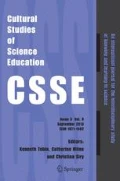Abstract
To enhance Aboriginal students’ educational opportunities in sciences, culturally relevant science curriculum has been examined and practiced in Western Canadian science classrooms. This article shares some examples of inclusion of indigenous knowledge in science curricula and discusses the improvement and challenges of culturally relevant science curricula in Canadian contexts.

Similar content being viewed by others
References
Aikenhead, G. S. (2000). Rekindling traditions: Cross-cultural science and technology units. Retrieved January 16, 2016 from http://www.usask.ca/education/ccstu/.
Aikenhead, G. S. (2001). Integrating Western and Aboriginal sciences: Cross-cultural science teaching. Research in Science Education, 31, 337–355.
Aikenhead, G. S. (2002). Cross-cultural science teaching: Rekindling traditions for Aboriginal students. Canadian Journal of Science, Mathematics and Technology Education, 2(3), 287–304.
Aikenhead, G. S. (2006). Towards decolonizing the pan-Canadian science framework. Canadian Journal of Science, Mathematics and Technology Education, 6(4), 387–399.
Aikenhead, G. S., & Elliott, D. (2010). An emerging decolonizing science education in Canada. Canadian Journal of Science, Mathematics and Technology Education, 10, 321–338.
Alberta School Boards Association. (2011). Ensuring First Nations, Métis and Inuit student success: Leadership through governance. Edmonton: Alberta School Boards Association.
Bougie, E., Kelly-Scott, K., & Arriagada, P. (2013). The education and employment experiences of first nations people living off reserve, Inuit, and Métis: Selected findings from the 2012 Aboriginal Peoples Survey.
British Columbia Ministry of Education. (2005). Science K to 7: Integrated Resource Package 2005. BC, Canada. Retrieved January 16, 2016 from http://www.bced.gov.bc.ca/irp/welcome.php.
CMEC (Council of Ministers of Education, Canada). (1997). Common framework of science learning outcomes: Pan-Canadian protocol for collaboration on school curriculum. Ottawa, ON: CMEC.
Council of Canadian Academies. (2014). Science culture: Where Canada stands. Ottawa, ON: The Expert Panel on the State of Canada’s Science Culture, Council of Canadian Academies.
Friesen, J., & Ezeife, A. (2009). Making science assessment culturally valid for Aboriginal students. Canadian Journal of Native Education, 32(2), 24–37.
Ignas, V. (2004). Opening doors to the future: Applying local knowledge in curriculum development. Canadian Journal of Native Education, 28, 49–60.
Library of Parliament. (2009). A statistical profile of poverty in Canada. Retrieved from Parliament of Canada website. http://www.parl.gc.ca/Content/LOP/ResearchPublications/prb0917-e.pdf.
Little Bear, L. (2009). Naturalizing indigenous knowledge: Synthesis paper. Saskatoon: Canadian Council on Learning, Aboriginal Learning Knowledge Centre.
O’Grady, K., & Houme, K. (2014). Pan-Canadian Assessment Program: Report on the Pan-Canadian Assessment of Science, Reading, and Mathematics. Toronto: Council of Ministers of Education, Canada.
Richards, J., Hove, J., & Afolabi, K. (2008). Understanding the Aboriginal/non-Aboriginal gap in student performance: Lessons from British Columbia (Commentary No. 276). Toronto: C.D. Howe Institute.
Snively, G. (2009). Money from the Sea: A cross-cultural indigenous science problem-solving activity. Green Teacher, 86, 33–38.
Snively, G., & Corsiglia, J. (2001). Discovering indigenous science: Implications for science education. Science Education, 85, 6–34.
Snively, G., & Williams, L. (2006). Aboriginal knowledge and science education project. Canadian Journal of Native Education, 29(2), 229–244.
Solano-Flores, G., & Nelson-Barber, S. (2001). On the cultural validity of science assessments. Journal of Research in Science Teaching, 38(5), 553–573.
Statistics Canada. (2013). The Educational Attainment of Aboriginal Peoples in Canada. Statistics Canada Catalogue no. 99-012-X2011003. Ottawa, ON: Statistics Canada.
Statistics Canada. (2014). Aboriginal peoples in Canada: First Nations people, Métis and Inuit. Ottawa: Statistics Canada.
Author information
Authors and Affiliations
Corresponding author
Additional information
Lead Editor: A. L. Tang.
Rights and permissions
About this article
Cite this article
Kim, M. Indigenous knowledge in Canadian science curricula: cases from Western Canada. Cult Stud of Sci Educ 12, 605–613 (2017). https://doi.org/10.1007/s11422-016-9759-z
Received:
Accepted:
Published:
Issue Date:
DOI: https://doi.org/10.1007/s11422-016-9759-z




